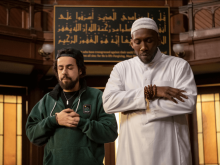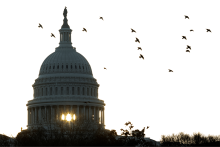Opinion

When the biblical writers penned words about the “creator of the heavens and the earth,” they didn’t have the faintest idea of what they were really saying. Yet Christian faith asserts the power that created galaxies full of black holes and dark energy is the same power that became mysteriously embedded in the uterus of a poor teenage girl in a forsaken village in present-day Palestine. The first chapter of the gospel of John describes Jesus’ arrival this way: “All things came into being through him, and without him not one thing came into being” (1:3). That defies all boundaries of rationality.

Here at Sojourners, we believe following Jesus means being “creatively maladjusted” to the dominant definitions of success; for us as editors, this means resisting the tyranny of fickle algorithms that have so much power in determining which stories get read and which don’t. We love the 10 stories listed below, but each year we publish hundreds of beautiful and important stories, interviews, columns, reflections, reviews, and poems — and darn it, we aren’t gonna let algorithms tell us (or you!) what stories matter most.

But as my research on the relationship between the New Testament and the development of popular Christian traditions shows, the earliest biblical descriptions do not mention the presence of any animals. Animals first start to appear in religious texts around the seventh century.

Churches far too often operate under the “male gaze.” The male gaze, a term I'm borrowing from film criticism, always answers the question of “Who is this for?” with “Well, men, of course.” Some congregations, even though they affirm women pastors, worship directors, and singers, still caution them to dress so that the men in the congregation don’t find them “tempting.” The male gaze is always cisgendered and heterosexual, so churches that are formed by the male gaze are structured to be hostile toward queer people (no matter how kind congregants in those churches are to queer individuals).

God’s promise in Advent is about meeting us wherever we are. We, too, can go out and build relationships with all our neighbors — housed or unhoused, incarcerated or not — as we prepare for a future where all people can be comforted.

The 1992 classic is full of wonders you can’t find anywhere else: Michael Caine starring in a children’s movie, a ghost of Christmas future that haunts me every time I consider splurging on frivolities, and a drum set at a Victorian England Christmas party. But the movie isn’t just a fun, Muppet-y take on Charles Dickens’ classic novella; it’s also a compelling screenplay with heart-warming, humorous songs that offer a radical Christmas message of “cast down the mighty … send the rich away empty.”

The list below reflects my own preference for films and shows that help me leverage my own viewership to sustain a lifestyle of equity and inclusion. I’ve included 10 films and shows that gave the spotlight to communities, issues, and stories that we usually don’t see — and how richer the world is because of them.

I know talking about international lending policies makes most people want to yawn, but the Bible takes debt — and the people who profit from it — seriously. In his opening Nazareth sermon (Luke 4), Jesus cites the prophet Isaiah to proclaim “the year of the Lord’s favor,” a passage that evokes the ancient instructions for debt forgiveness, such as those found in Deuteronomy 15 (“Every seventh year you shall grant a remission of debts”). While biblical scholars can’t confirm that these Jubilee injunctions were fully lived out, these instructions were understood to be a regular course corrective to extreme inequality and injustice. Other parts of the Bible flat-out forbid charging interest when the person seeking the loan is poor (Exodus 22:25, Leviticus 25:37).

In recent years it’s become clearer how young women are leading the global movement calling for climate justice, even as government leaders fall short at global talks. Young women and girls have been shown to be catalysts for linguistic change — experimenting, gradually updating norms, and leading linguistic disruption. Children in general, but girls especially, have been shown to be more effective climate messengers to older generations.

Christians who appreciate soccer, when we watch the World Cup, are not only celebrating stunning aerial goals but are also learning about sin and evil. The workers exploited for the World Cup, which ultimately is a purely recreational event, need to be mourned. Migrant labor markets all over the world prioritize money over human lives — the United States. We live authentically as people of faith in this corrupt world when we acknowledge sin, challenge the powers that be, and work for change so as to prevent the sin’s recurrence.

I can’t deny the unbridled excitement that this global phenomenon unleashes every four years. And since this year’s tournament is taking place in November (to avoid Qatar’s crushing summer heat), the international fervor coincides with the start of Advent. Somehow, it all feels fitting.

Day is who Mayfield looks to when her soul is parched and she longs to be renewed with God’s love “in order to keep going.” I found Unruly Saint spiritually nourishing in this way: It wrestles with the questions of how we keep going, how we keep having hope in our exhausting world, how we keep our inner light burning. “She wanted to keep a flame lit for people wondering how to break the cycles of war and oppression built into our histories and hearts,” Mayfield writes.

Ramy is a Hulu series wrestling with deep questions of faith from Muslim 20-something son of Egyptian immigrants. The show follows Ramy Hassan, played by comedian Ramy Youssef, as he navigates the tensions of dīn and dunyā — religion and the world. Transcending the clichés of blind religiosity, terrorist sympathies, and the social ignorance stereotypically associated with Arab and Muslim American life, Ramy shows us the messy work of finding our own way in the world between halal (permissible) and haram (not permissible).

Voting, while essential, is just the starting point when it comes to following the mission Jesus outlines in his initial sermon in Nazareth to “bring good news to the poor … and proclaim the year of the Lord’s favor” (Luke 4:18-19). Civic discipleship recognizes that in our democracy — imperfect as it may be — fulfilling Jesus’ call to bring God’s reign of justice, righteousness, and inclusive love closer to earth requires that we are actively and at times courageously engaged in our politics. The marriage of our civic participation with being followers of Jesus is rooted in the conviction that our deep civic engagement is because of our faith, not despite it.

Tár may be a 158-minute movie, but it starts rolling its credits at the beginning of the film. Not the usual type of opening credits, listing the names of movie stars and the director. Rather, Tár begins with what movie industry folks call “below-the-line” credits, showing the names of orchestra musicians and the various studio personnel. Most movies would save these credits for the end of the film, but Tár begins by listing every musician and laborer’s name, glowing white text on a black background.

We must reject the idea that wealth has any bearing on a person’s true acumen, potential, or value. This is harder than we might think and takes some deliberate work. Frankly, it might be harder and more important to rethink our ideas around poverty, recognizing that a person’s lack of money doesn’t tell you anything about the value of who they are, what they’re capable of, or what they have to offer the world.

But it’s not the absence of Chadwick Boseman — whose death in 2020 is paralleled by T’Challa’s fate in the film — that makes the film fall short. Wakanda Forever suffers from the same ailment as much of the larger Marvel Cinematic Universe: It tries to offer individualistic answers to systemic evils. Unfortunately, there are evils in the world we can’t simply punch to death

This election is just the most recent manifestation of deeper social divides in both the U.S. and Brazil. Benjamin A. Cowan, a historian at the University of California San Diego, notes that, since the 1980s, both countries have experienced a coalescing of “moral majorities” and right-wing populist groups, often with conservative Christians on the front lines. In Brazil, like in the U.S., certain affinities are grouped together. In the United States, a political slogan like “Jesus, guns, babies” attracts conservative constituents. In Brazil, conservatives rally around “beef, Bible, and bullets.” No wonder it feels like Texas.

I don’t often turn on a non-news network television show and expect to learn. Instead, I expect to laugh, maybe cry (I’m looking at you, This Is Us), see loads of inaccurate depictions of medical interventions, or simply be entertained. But ABC’s new primetime drama Alaska Daily has me expanding my perspective on the possibilities of network TV. And that’s thanks to the light it’s bringing to a dark truth: the crisis of missing and murdered Indigenous women.

Yet, in this charged atmosphere, Jesus calls us to be peacemakers — regardless of our political leanings or party affiliation. So, what does peacemaking look like during the upcoming midterms?